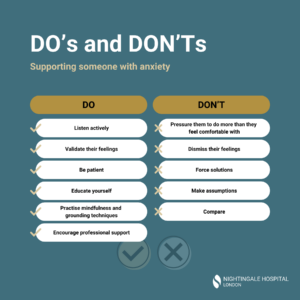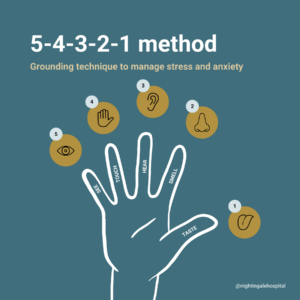Reviewed by: Cassandra Govender, Lead therapist for general psychiatry
Anxiety is a feeling of unease, such as worry or fear and this can be experienced on a spectrum ranging from mild to severe. Everyone will experience some form of anxiety throughout their lives. However, when feelings of anxiety are more than a temporary worry and the feelings do not go away but instead get worse over time, this may signal the need to consult a professional.
In 2021/22, 22.5% of people in the UK reported high levels of anxiety and it is estimated that in any given week in England, the prevalence of generalised anxiety disorder (GAD) is 6 in 100 people.
With these statistics in mind, there is a strong likelihood that you or someone you know suffers with high levels of anxiety. Those with high levels of anxiety may feel consumed by fears of things that might seem irrational to others. It can be hard to relate to these concerns, and as a result, many people don’t know how to best help someone with anxiety. Supporting someone with anxiety involves understanding, empathy, and patience. Here are some do’s and don’ts to keep in mind.

The DO’s
DO: Listen actively
Sometimes, just having someone to talk to can alleviate anxiety. By listening actively, you are creating a safe space where your loved one can share their difficulties. You can listen actively by putting away distractions, asking open-ended questions, and showing empathy in your responses such as “It’s okay to feel this way”.
DO: Validate their feelings
Validation is a process in which one person affirms or validates the reality, thoughts, feelings, memories, and/or experiences of another. Validation can be done verbally (e.g., “You’re right to feel that way”) or nonverbally (e.g., nodding in agreement). We all need validation because it helps us know that we are not alone with our thoughts and feelings. Sometimes people just need an understanding ear to listen without judgment in order for them to come up with their own solutions to problems they may be having.
DO: Be patient
Being patient with your loved one allows them to navigate their anxieties without feeling added pressure or stress. Allow them time to process their thoughts and feelings, understand that plans might need to change last minute due to their anxiety and let them know that you’re there for them no matter what. Phrases like “Take your time” or “We’ll get through this together” can be very comforting.
DO: Educate yourself
Ask about their experience of anxiety and try to learn more about anxiety in general. They will feel supported and cared about by you attempting to understand their issues.
DO: Encourage them to practise mindfulness and grounding techniques
4-4-4-4 breathing

4-4-4-4 breathing, commonly known as box breathing, is a simple breathing technique that you can practise if someone is having a panic attack or to help calm anxieties. It works by distracting your mind and body from the anxiety trigger and reduces your raised heart rate.
- Take a breath then exhale for 4 seconds
- Hold your breath for 4 seconds
- Inhale for 4 seconds
- Hold your breath for 4 seconds
- Repeat as many times as needed
Sitting down an upright posture and open chest is the best way to practise 4-4-4 breathing, but it can be done stood up too.
5-4-3-2-1 method

The 5-4-3-2-1 method is a grounding exercise designed to manage stress and anxiety. It works by using the five senses to ground you in the present moment, and counteracting your fight or flight response, bringing your nervous system back to a more balanced state.
- 5: Name 5 things you can SEE
- 4: Name 4 things you can HEAR
- 3: Name 3 things you can FEEL
- 2: Name 2 things you can SMELL
- 1: Name 1 thing you can TASTE
DO: Encourage professional support
For someone who is experiencing prolonged periods of anxiety, or their anxiety is so severe as to inhibit their life, it may be time to talk to a professional for support. There are many ways that professional treatment can support, including psychotherapy, CBT and medication.
The DON’Ts
DON’T: Pressure them to do more than they feel comfortable with
Pressuring someone with anxiety to engage in activities or situations beyond their comfort level can exacerbate their anxiety. Instead, respect their boundaries, allowing them to progress at their own pace. Respecting their limits fosters a sense of safety and control, which is crucial for managing anxiety.
DON’T: Dismiss their feelings
Dismissing someone’s feelings when they are experiencing anxiety can make them feel misunderstood, invalidated, and unsupported. To avoid this, try not to use minimising phrases such as “You’re overreacting” or “It’s all in your head”, listen without interrupting or judging them and acknowledge that even if you don’t fully understand anxiety, it is their reality.
DON’T: Force solutions
While it’s natural to want to fix things, sometimes they just need someone to listen rather than solve their problems. Asking someone outright, “Would you like me to help you find solutions or would you prefer that I listen?” allows the person struggling to have their needs met. However, you can express concern for your loved one if their anxiety has escalated to a point where it is unmanageable and inhibiting their life.
DON’T: Make assumptions
Even if you have experienced anxiety yourself, no one’s anxiety is the same. Avoid making generalisations or saying phrases like “I know exactly how you feel”. Instead, respect their individual experience and be open to their perspective. By avoiding assumptions and focusing on understanding their unique experience, you can provide more effective and empathetic support to someone with anxiety.
DON’T: Compare
Excessive comparisons can undermine the feelings and experiences of someone with anxiety. Instead of comparing, express empathy by acknowledging their pain and difficulty. For example: “I’m sorry you’re going through this. It sounds really tough”.
Looking for support for anxiety?
If you are looking for further support for a loved one, our team are here to discuss your options. You can submit an enquiry form here and our team will be in touch with you.







